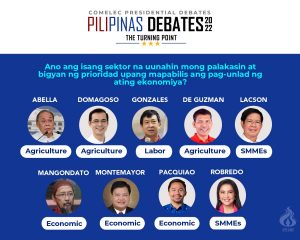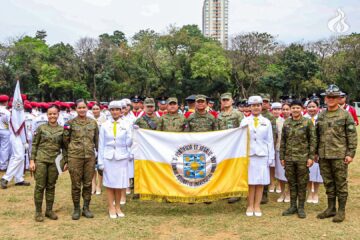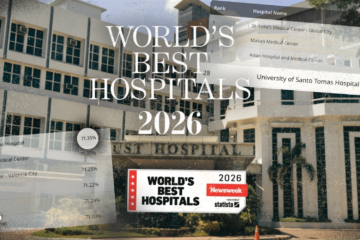by NILLICENT BAUTISTA

THREE PRESIDENTIAL bets vowed to prioritize the agricultural industry for economic revival during the Commission on Elections’ first presidential debate.
Former presidential spokesperson Ernesto Abella, labor leader Leody de Guzman, and Manila City Mayor Francisco “Isko Moreno” Domagoso said focusing on the agricultural sector would help address the problems in food security and livelihood.
“We plan to make the sector an agricultural powerhouse where other industries are attached to it because we need a national industry that we can scale up,” Abella said during “PiliPinas Debates 2022: The Turning Point,” held Saturday.
He added that he plans to “sufficiently increase” the country’s gross domestic product (GDP) through agricultural initiatives and address the needs of the youth.
Meanwhile, De Guzman said he would focus on the agricultural industry in the first year of his term should he win the presidential race, as this would address the problem of malnutrition and food security.
“Ang pokus ng unang mga taon ay ang pagsisimula ng pagbuhay sa ating agriculture para lumikha ng maraming pagkain, sapat na pagkain para sa hapagkainan ng ating mamamayan dahil marami sa mga kabataan natin ngayon ay malnourished, maraming nagugutom. Ito ang ating i-secure. At kailangan nating paunlarin ito, ‘yung sakahan natin,” De Guzman said.
He also noted that the rice tariffication law must be suspended as this hampers the improvement of the country’s agri-industry.
Republic Act No. 11203, otherwise known as the Rice Tariffication Law, removed quantitative restrictions in rice imports, resulting in reduced prices of domestic rice products.
“Hindi pwedeng lahat na lang ng ating pangangailangan ay ini-import natin nang napakamahal. Naubos ang naipong yaman ng ating bansa,” De Guzman added.
Domagoso said he would prioritize investing in agriculture to improve the lives of local farmers.
“Ang pinakaimportanteng ekonomiya ay ang ekonomiya ng sikmura. Food security is the trust. ‘Yon ang pupuntahan ko na direksyon pag ako po ay binigyan niyo ng pagkakataon,” he said.
Domagoso emphasized that the pandemic has shown why the country should not depend on imported products and instead invest in locally-produced food products.
Micro, small, and medium enterprises
Sen. Panfilo “Ping” Lacson and Vice President Maria Leonor “Leni” Robredo said they would prioritize investing in micro, small, and medium enterprises (MSMEs) as this sector has a more significant impact on the country’s GDP than agriculture.
“Ang agrikultra hindi naman binabalewala, pero 10 percent lang ang kontribusyon nito sa GDP at ang kontribusyon niya sa employment 22 percent. Mas malaki po ang tama sa MSMEs,” Lacson said.
Lacson also proposed a comprehensive fiscal stimulus for the recovery of MSMEs.
Robredo said she would prioritize improving the state of MSMEs, for they have been the most affected by the pandemic.
“We have 99.5% of all businesses considered as MSMEs. They generate 5.7 million employees. We have a little over 2 million MSMEs, but 400,000 lost their jobs as 76,000 MSMEs stopped their operations,” she said.
Aside from the available fund allocated for MSMEs, Robredo proposed an additional P100 billion stimulus fund to revive the state of MSMEs in the country, which also significantly affects the economy.
“Portions of this P100 billion (fund) are allocated into conditional cash grants, low-interest loans for their recovery. But this stimulus fund should also be allocated to capacity building, to help them become digitized and find a good market,” Robredo said. F



